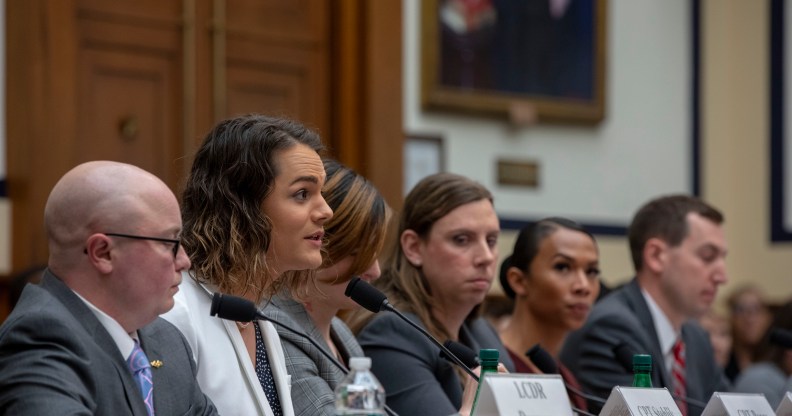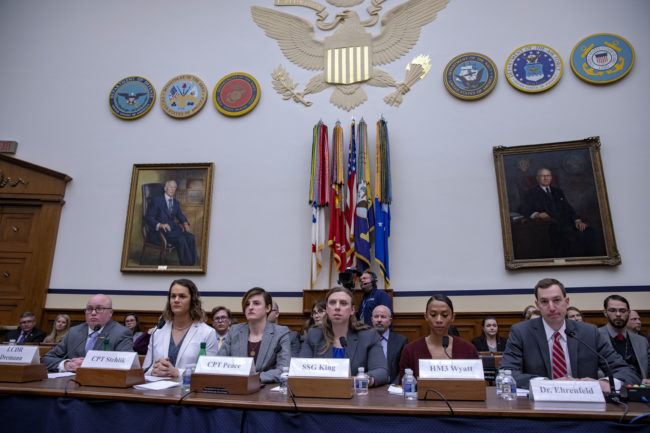Transgender troops tell Congress transitioning made them stronger

Army Captain Alivia Stehlik speaks at the Military Personnel Subcommittee hearing on “Transgender Service Policy.” on Capital Hill on February 27, 2019 in Washington, DC. (Tasos Katopodis/Getty)
Transgender troops have testified on Capitol Hill about their ability to serve in the military, saying that undergoing the process of transitioning has made them stronger.
Five active duty transgender service members testified in front of the House Armed Services Subcommittee on Military Personnel on Wednesday (February 27).
Army Staff Sergeant Patricia King has served in the military for 19 years and has been deployed to Afghanistan three times. Navy Lieutenant Commander Blake Dremann and Army Captain Jennifer Peace have both been in the armed forces for more than 15 years, while Army Captain Alivia Stehlik has been serving for a decade and Navy Petty Officer 3rd Class Akira Wyatt for seven years.
Stehlik, an infantry officer and West Point graduate who has been serving for a decade, transitioned in 2016 and came back from her deployment in Afghanistan in January.

Five active duty transgender troops speak at the Military Personnel Subcommittee hearing on February 27, 2019 in Washington, DC. (Tasos Katopodis/Getty)
“What is the value of having transgender people in the military? Based on my experience first as a combat arms officer and medical provider, the answer is unequivocally that my transition—and so many others—has dramatically increased the readiness and lethality of every branch of the armed forces,” Stehlik told the committee, quoted in the Associated Press (AP).
Committee chairwoman, Congresswoman Jackie Speier, organised the meeting and thanked the transgender troops for their courage in sharing their experience on such a public platform.
Speier said there are 14,700 transgender individuals currently serving in the army.
According to USA Today, 1,524 transgender soldiers have been diagnosed with gender dysphoria in the past three years, when they became able to serve openly.
The cost of the treatment incurred by the Department of Defense for all these troops was estimated at $7.9 million—which amounts to less than one hundred-thousandth, or 0.001 percent, of the 2019 military budget alone.
Trump’s ban on transgender troops compared to “Don’t Ask, Don’t Tell” policy
Speier dubbed the policy proposed by President Donald Trump’s administration as “discriminatory, unconstitutional and self-defeating” and warned it would mark a return to the “Don’t Ask, Don’t Tell” regime preventing gay, lesbian and bisexual soldiers from openly serving in the army, which was repealed under President Barack Obama in 2010.
“Telling transgender service members they can serve but not fully express their identities would represent a return to the froth paranoia of ‘Don’t Ask, Don’t Tell,'” said Speier, who fought to lift the previous ban on transgender troops openly serving in the military in 2015.
Speier pointed out that army officials do not see allowing transgender troops to serve openly in the military as having any negative repercussions on the soldiers’ combat abilities and that a ban on openly transgender service members would affect the number of recruits at a time “so few Americans are willing to serve.”
She added: “Transgender troops have the right to serve as their full selves and should not have to live in fear of being found out. Our five witnesses and their peers deserve better.”
“You’re transgender and only if you agree not to transition, then you can serve, that’s just like ‘Don’t Ask, Don’t Tell.”
— Rep. Anthony Brown
Retired Air Force General James N. Stewart represented the administration at the hearing and claimed the policy, which is currently blocked by litigation, is not a ban on transgender troops as they can still serve as long as they are not diagnosed with gender dysphoria and agree to serve in their sex assigned at birth.
Maryland Democratic Representative Anthony Brown rejected Stewart’s claim, pointing out that preventing transgender troops to serve openly is equivalent to a ban.
“You’re transgender and only if you agree not to transition, then you can serve, that’s just like ‘Don’t Ask, Don’t Tell,’” he said, quoted in AP.

